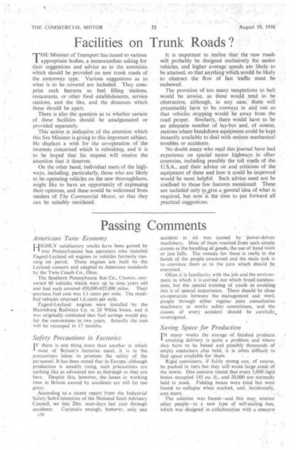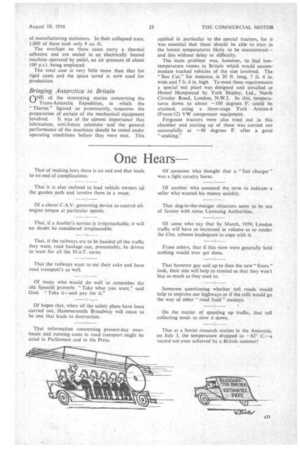Passing Comments
Page 32

Page 33

If you've noticed an error in this article please click here to report it so we can fix it.
Americans Taste Economy
t4IGHLY satisfactory results have been gained by " two Pennsylvanian bus operators who installed Fageol-Leyland oil engines in vehicles formerly running on petrol. These engines are built by the Leyland concern and adapted to American standards by the Twin Coach Co., Ohio.
The Southern Pennsylvania Bus Co., Chester, converted 60 vehicles which were up to nine-. years old and had each covered 450,000-625,000 miles. Their • previous fuel cost was 3.1 cents per mile. The modified vehicles returned 1,6 cents per mile. Fageol-Leyland engines were installed by the Harrisburg Railways Co. in 20 White buses, and it was originally estimated that fuel savings would pay for the conversions in two years. Actually the cost will be recouped in 17 months.
Safety Precautions in Factories
IF there is one thing more than another in which I most of Britain's factories excel, it is in the precautions taken to promote the safety of the personnel. It has been stated that in Europe, although production is steadily rising, such precautions are nothing like as advanced nor as thorough as they are here. Despite this, however, the losses in working time in Britain caused by accidents are still far too great.
According to a recent report from the Industrial Safety Sub-Committee of the National Joint Advisory Council, we lost 20m. man-days last year through accidents. Curiously enough, however, only one A30 accident in six was caused by power-driven machinery. Most of them resulted -from such simple causes as the handling of goods, the use of hand took or just falls. The remedy for these is really in the hands of the people concerned -and the main task is to convince them as to the care which should be exerc i sed.
• Often it is familiarity with the job and the environment in which it is carried out which breed carelessness, but the special training of youth in a-voiding this is of special importance. There should be close co-operation between the management and work people through either regular joint consultative machinery or works safety committees, and the causes of every accident should be carefully. investigated.
Saving Space for Production
I N many works the storage of finished products awaiting delivery is quite a problem and where they have to be boxed and possibly thousands of empty containers also held, it is often difficult to find space available for them.
Rigid containers, if fairly strong can, of course, be packed in tiers but they still waste large areas of the stores. One concern found that every 1,600 rigid boxes occupied 145 cu. ft., and 20,000 are normally held in stock. Folding boxes were tried but were found to :collapse when stacked, and, incidentally, cost more.
The solution Was found—and this may interest other people—in a new type of self-sealing box, which was designed in collaboration with a concern of manufacturing stationers. In their collapsed state, 1,000 of these took only 8 cu. -ft.
The overlaps on these cases carry a thermal adhesive and are sealed in an electrically heated machine operated by pedal, an air pressure of about 100 p.s.i. being employed.
The total cost is very little more than that for rigid cases and the space saved is now used for production.
Bringing Antarctica to Britain
nN-E of the interesting stories concerning the Trans-Antarctic Expedition, in which the " Theron " figured so prominently, -concerns the preparation of certain of the mechanical equipment
involved. It was of the utmost importance that lubrication, anti-freeze solutions and the • general performance of the machines should be tested under operating conditions before they were sent. This applied in particular to the special tractors, for it was essential that these should be able to start in the lowest temperatures likely to be encountered— and this without delay or difficulty.
The main problem was, however, to find lowtemperature rooms in Britain which would accommodate tracked vehicles of the size involved. The " Sno Cat," for instance, is 20 ft. long, 7 ft. 6 in. wide and 7 ft. 6 in. high. To meet these requirements a special test plant was designed and installed at Hemel Hempstead by York Shipley, Ltd., North Circular Road, London, N.W.2. In this, temperatures down to about —100 degrees F. could be attained, using a three-stage York Arcton-6 (Freon-12) VW compressor equipment.
Ferguson tractors were also tried out in this chamber and starting up of these was carried out successfully at —40 degrees F. after a good "soaking.."




































































































